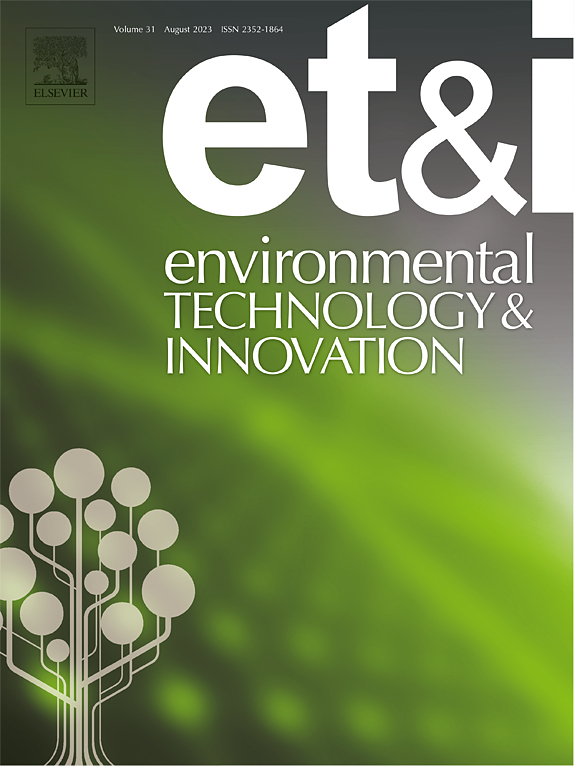The effect of moisture content on dynamics changes of antibiotic resistance genes during sheep manure composting on Qinghai-Tibet Plateau: Insight into changes in potential host microorganisms
IF 6.7
2区 环境科学与生态学
Q1 BIOTECHNOLOGY & APPLIED MICROBIOLOGY
引用次数: 0
Abstract
The Qinghai-Tibet Plateau is characterized by its low temperature and thin oxygen climate, which results in hypoxic conditions during the composting of livestock and poultry manure in this region. Reducing moisture content can enhance oxygen flow through the composting pile, thereby improving humification efficiency. However, the impact of moisture content on antibiotic removal and changes in antibiotic resistance genes (ARGs) during animal manure composting on the Tibetan Plateau remains unclear. Building upon prior research, this study further investigated the dynamic changes of antibiotic concentration and ARGs during sheep manure composting on the Qinghai-Tibet Plateau at two moisture contents: 45% (M45) and 60% (M60). Additionally, the study analyzes the influencing factors and host microorganisms associated with ARGs. The results showed that, compared with M60, M45 could significantly decrease the concentrations of oxytetracycline, cephalosporin C, and penicillin in compost products by 4.37%, 3.94%, and 4.37%, respectively (P < 0.05). M45 can influence the dynamic changes of ARGs by altering the temperature, pH, total nitrogen, organic matter, humus content, and microbial communities of compost. Compared with M60, M45 reduced the abundance of ARGs conferring resistance to beta-lactam, multidrug, bacitracin, tetracycline, and vancomycin. Corynebacterium, Jeotgalicoccus, Nocardiopsis, Brachybacterium, and Arthrobacter were the main potential hosts of ARGs during the early stages of composting, whereas Streptomyces, Pseudoxanthomonas, Luteimonas, and Thermobifida became the main potential hosts during the late stages. These findings suggest that reducing moisture content can significantly enhance the removal efficiency of antibiotics and ARGs in sheep manure compost on the Qinghai-Tibet Plateau.
水分含量对青藏高原羊粪堆肥过程中抗生素抗性基因动态变化的影响——对潜在宿主微生物变化的洞察
青藏高原低温贫氧气候的特点,导致该地区畜禽粪便在堆肥过程中处于缺氧状态。降低水分含量可以增强堆肥堆中的氧流量,从而提高腐殖化效率。然而,青藏高原动物粪便堆肥过程中水分含量对抗生素去除和抗生素抗性基因(ARGs)变化的影响尚不清楚。本研究在前人研究的基础上,进一步研究了青藏高原羊粪在45% (M45)和60% (M60)两种含水量下堆肥过程中抗生素浓度和ARGs的动态变化。此外,本研究还分析了与ARGs相关的影响因素和宿主微生物。结果表明,与M60相比,M45能显著降低堆肥产物中土霉素、头孢菌素C和青霉素的浓度,分别降低4.37%、3.94%和4.37% (P <; 0.05)。M45可以通过改变堆肥的温度、pH、全氮、有机质、腐殖质含量和微生物群落来影响ARGs的动态变化。与M60相比,M45降低了对-内酰胺、多药、杆菌肽、四环素和万古霉素耐药的ARGs的丰度。在堆肥前期,杆状杆菌、准galicoccus、Nocardiopsis、Brachybacterium和Arthrobacter是ARGs的主要潜在宿主,而在堆肥后期,Streptomyces、Pseudoxanthomonas、Luteimonas和Thermobifida成为ARGs的主要潜在宿主。综上所述,青藏高原羊粪堆肥中降低水分含量可显著提高抗生素和ARGs的去除效率。
本文章由计算机程序翻译,如有差异,请以英文原文为准。
求助全文
约1分钟内获得全文
求助全文
来源期刊

Environmental Technology & Innovation
Environmental Science-General Environmental Science
CiteScore
14.00
自引率
4.20%
发文量
435
审稿时长
74 days
期刊介绍:
Environmental Technology & Innovation adopts a challenge-oriented approach to solutions by integrating natural sciences to promote a sustainable future. The journal aims to foster the creation and development of innovative products, technologies, and ideas that enhance the environment, with impacts across soil, air, water, and food in rural and urban areas.
As a platform for disseminating scientific evidence for environmental protection and sustainable development, the journal emphasizes fundamental science, methodologies, tools, techniques, and policy considerations. It emphasizes the importance of science and technology in environmental benefits, including smarter, cleaner technologies for environmental protection, more efficient resource processing methods, and the evidence supporting their effectiveness.
 求助内容:
求助内容: 应助结果提醒方式:
应助结果提醒方式:


